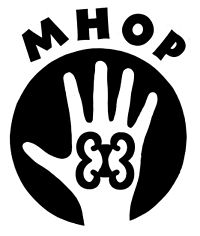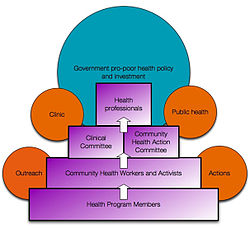- Mali Health Organizing Project
-
Mali Health Organizing Project 
Mali Health Organizing Project's logoMotto Promoting health change, not charity Formation 2006 Type NGO Location Bamako, Mali Region served West Africa Official languages Bambara, French, English Key people Mouhammadoun Niang, Director Caitlin Cohen, US Executive Director
Website Mali Health Organizing Project Mali Health Organizing Project (established in 2006) is a non-governmental organization with 501(c)(3) status that enables economically depressed neighborhoods in Mali, Africa to design, build and implement their own health care systems, and impels the Malian government to invest in its citizens' health.
MHOP's stated goal is to create the first government-sponsored universal health care system in Mali and to help others reproduce our model around the world.[1]
Contents
History
MHOP was founded in Sikoroni, Bamako, Mali by Caitlin Cohen, Lindsay Ryan and Erica Trauba, students at Brown University who had previously volunteered in Bamako.[2][3]
Cohen, Ryan and Trauba believed that the role of a development organization is to foster rather than replace local groups and government action. Similarly, Mouhammadoun (Modibo) Niang (MHOP's current executive director), Rokia Savané (vice-president of Coordination Des Associations Et ONG Feminines Du Mali and an official representative to MHOP), Siriki Coulibaly (adviser to Sikoroni's chief and the town’s official representative to MHOP) and numerous other leaders in Sikoroni were frustrated by a history of failed projects, including a huge aid-agency water project that left the community without water, without the $30,000 they had contributed, and without many children who died because of iron contamination.[4]
Since 2006, MHOP has grown enormously, with 120 U.S.-based volunteers and partnerships with groups at the University of Michigan, Northwestern University, Harvard University, and high schools in Chicago, Illinois and Vermont. Over 75 Malians regularly volunteer with MHOP, and two women act as part-time women’s empowerment coordinators (Cohen 2008, p. 1).
Model
MHOP endeavors to unite communities by employing four tools to bring local leaders and their government together: organizing, accountability, communication and seed funding. This approach is intended to address both health crises and their root cause, the deadlock between government and slum communities.
Organizing
MHOP has participating towns town elect leaders to design, implement, and evaluate their own health programs. In this way, community members can see the results of their labor in the physical health of their neighbors and families.
Accountability
Many community members in Sikorni fear that taxes end up in someone's pocket, that their contributions will be horded by corrupt individuals rather than used for the greater good. To address this problem, MHOP asked Sikoroni's community committees to design an accounting system. MHOP holds community taxes and its own contributions in escrow. If the government does not contribute their share and a service is not implemented, funding is returned to people who hold tax receipts. The community committees, MHOP, and the government co-sign on all accounts.
Communication
Residents of economically depressed urban areas - also called slums - lack political rights and transportation. They are also unable to negotiate with officials. MHOP uses its influence to arrange meetings with government leaders and involves spokespeople from the slum in the ensuing conversations.
Funding
Most health programs have high start-up costs and lower maintenance costs. The initial costs of programs can be discouraging or prohibitive. For this reason, MHOP uses money as an enticing lure: If the slum provides roughly 20% of seed costs and the government provides 45%, MHOP will provide 35%.[1]
Trivia
Caitlin Cohen, MHOP's US Executive Director, and a brief description about MHOP appear on the reverse side of 100 million bags of Frito-Lay's Doritos' flagship flavor, Nacho Cheese. The free advertising space was a result of Cohen's recognition by DoSomething.org in Summer 2008 for her work with MHOP.[5]
References
- Cohen, Caitlin (2008). "Jenzabar Foundation Grant application."
- ^ a b "MHOP's Fall 2008 newsletter". MHOP. http://www.malihealth.org/ht/a/GetDocumentAction/i/1425. Retrieved 2008-11-15.
- ^ "Using Health to Build Power in Slums in Mali". Changemakers.net. http://www.changemakers.net/node/12779. Retrieved 2008-11-13.
- ^ "MHOP's international leaders". MHOP. http://www.malihealth.org/ht/d/sp/i/202/pid/202. Retrieved 2008-11-13. See above referenced names.
- ^ "MHOP's Model and History". MHOP. http://www.malihealth.org/ht/d/sp/i/183/pid/183. Retrieved 2008-11-14.
- ^ "Find us on Doritos bags". MHOP. http://www.malihealth.org/ht/display/ReleaseDetails/i/1318. Retrieved 2008-11-14.
Categories:- Medical and health organizations
- Organisations based in Mali
Wikimedia Foundation. 2010.

